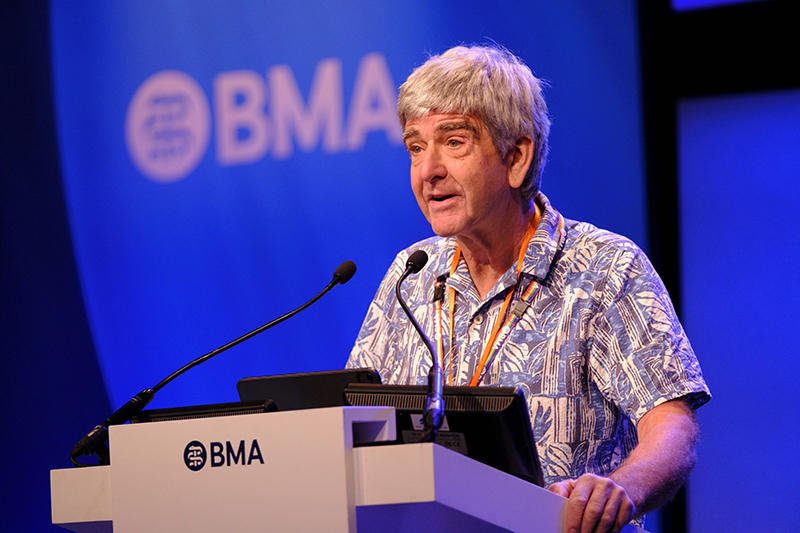Preparing to speak at this year’s BMA annual representative meeting, medical student Leah Brooksbank checked her current student loan statement.
The balance was £104,000.
She was speaking in favour of a motion calling for the Government to cover any student loan repayments due while a doctor is in NHS medical employment to be paid by the Government in a bid to improve recruitment and retention of doctors amid the current workforce crisis.
‘When I came into medicine, I had the plan of working in the NHS for life,’ explained Ms Brooksbank (pictured above). ‘I’m so grateful for everything that it’s done for myself and my loved ones.
‘However, flash forward to now, and standing before you now, I’d be a liar if I said that I hadn’t researched working abroad or changing careers completely. And I know that there are medical students and doctors that feel the same.
‘There’s no longer an incentive for medics to stay working in the NHS; pay has been eroded, working conditions are terrible, burnout is high – and on top of it we have this enormous student loan following us around wherever we go.
‘You don’t need me to tell you that retention is the important thing. This motion, though it will be a small step towards retention, is an important incentive for doctors to stay in the NHS.’
Foreign shores
Brian Guttridge, a retired doctor in Cornwall and chair of the BMA retired members committee, introduced the motion, on 4 July. He noted the large proportion of doctors already leaving to work overseas for better pay and conditions, or who were intending to.
After publication of the long-term workforce plan last week, he said: ‘Retention seems to be the new buzzword, politically. So let’s build on that.’
 GUTTERIDGE: Doctors leaving for better pay
GUTTERIDGE: Doctors leaving for better pay
He said ongoing pay restoration campaigns ‘must continue’ but believes making changes in other areas can help.
‘The burden of having such an exceptionally large student loan is probably putting a lot of excellent people off taking up a medical career, particularly those from less well-off backgrounds,’ said Dr Guttridge.
‘For those working there’s a worry it will never be repaid. We know all too well how stressful our jobs can be. And added financial stress can only make things worse.’
He added: ‘I’m not naïve enough to think that our government is going to jump at the opportunity to do this. But there is an issue here and various solutions can be envisaged.
‘A convincing argument can be made that many doctors have unusually large loans. Taking things a step further, the NHS should be able to see the value of incentivising doctors to stay in the NHS. It will be win-win to retain more doctors: a bigger workforce, shorter waits for patients, lower agency costs and fewer rota gaps.’
Possible disruption
Some concerns were raised, with Javier Cores, deputy chair of the BMA medical students committee for finance, asking how the motion would fit within existing policy, a three-pronged approach requesting NHS England accepts medical students as part of the NHS Learning Support Fund which offers £5,000 per year training grants, calling for further means-tested grants for medical students and asking for access to student finance loans.
Dr Gutteridge said: ‘There are so many doctors with large student loans already,’ and reiterated the motion is about all doctors, not current students.
Manchester-based junior doctor Bradley Allmond, called for the motion to be taken as a reference, which meant the representatives would accept its spirit but it would not become BMA policy. This was because he felt it might ‘trap’ doctors in the NHS because they would face significant debt if they left.
Dr Guttridge said this wouldn’t be the case, with doctors still free to go and work in the private sector – though he acknowledged loans would only be repaid, or partly repaid, as long as the doctor works for the NHS.
The motion passed, with 75 per cent voting in favour.

